29 Mar April 2021 Newsletter
April 2021 Newsletter
Welcome to the April 2021 edition of the Daniels Foundation Newsletter. In this issue, we explore the following topics. Click on the links to read the articles!
Daniels Family Newsletter Survey Results: The Communications Committee of the Daniels Foundation has been exploring improvements to the Foundation newsletter for some time now, and recently conducted a survey of Daniels family members. Click here to read more…
You Know You’re a Daniels If…: As part of the recent survey, we asked respondents to complete this sentence, and most folks obliged us. What fun to see what people had to say!! Click here to read more…
Esther Martin Daniels: This is the final installment of the series of biographies of the wives of the G1 brothers. Esther Daniels was the wife of the youngest founding brother, Dwight, and coincidentally the author’s grandmother. Click here to read more…
Smaller Grants: While our e-newsletter has typically highlighted grant recipients being awarded $25,000 or more, the Daniels Foundation also awards smaller grants on a regular basis. Click here to read more…
Pakachoag Music School: Since 2011, the Daniels Foundation has approved the grant request in the range of $3,000 annually for the Pakachoag Music School. Though it is a smaller request amount, the impact of our funding has helped expand and develop this school through the years. As the Board has consistently looked to fund programs where our dollars can have the greatest impact, we want to spotlight one such group. Click here to read more…
Salisbury Singers: Like the Pakachoag Music Group, which is mentioned in this e-newsletter, the Daniels Foundation has funded the Salisbury Singers for many years. Click here to read more…
Daniels Family Newsletter Survey Results
The Communications Committee of the Daniels Foundation has been exploring improvements to the Foundation newsletter for some time now. We originally started it as a vehicle to keep the broader family informed about the activities of the Foundation. As a result of discussions and comments offered up at the recent Daniels Family Reunion, we have come to understand that the broader family views the activity of the Foundation as something which binds us together as a family. While the Foundation continues its good work to represent the family in Worcester, we have realized that the newsletter could serve to also capture the history that flows from Fred Harris Daniels and his three sons and deepen our relationship to each other.
We recently conducted a survey to which 31 of you ultimately responded (a 53% response rate). We thank you for your patience with our fits and starts at getting it out the door. It is important to note that 47% of you did not respond, and so the following data represents those who are already pre-disposed to enjoy the newsletter. Even so, here’s what you have said:
More than 64% of respondents said they like the newsletter and look forward to receiving it quarterly. Another 23% said that most articles interested them, but not all articles.
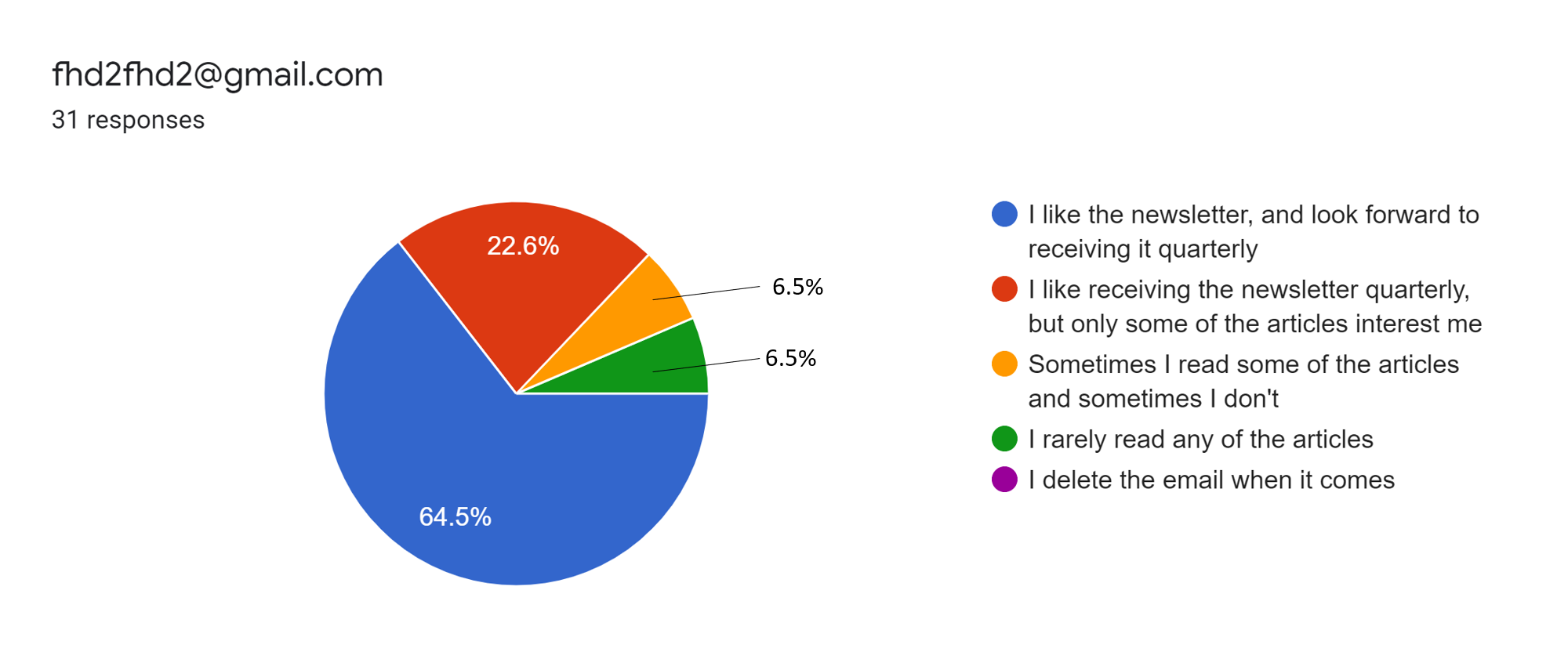
Comments associated with the overall attitude to the newsletter included a wish to keep up with the family, an enjoyment in learning more about family history, and appreciation for the fact that the Daniels family and the Foundation were maintaining good work and a good connection to Worcester. People also noted that they were generally too busy to give much time to the Foundation and this was an easy way keep in the loop.
When asked about newsletter topics which interested them the most, by far and away the strongest interest was in the biographical articles on family members. When the “very interesting” category and the “interesting” category were added together, it was clear that the biographical articles, profiles on board members, and profiles of grant recipients were approximately equal in interest. Lagging were the articles with information about Worcester and about grantmaking.
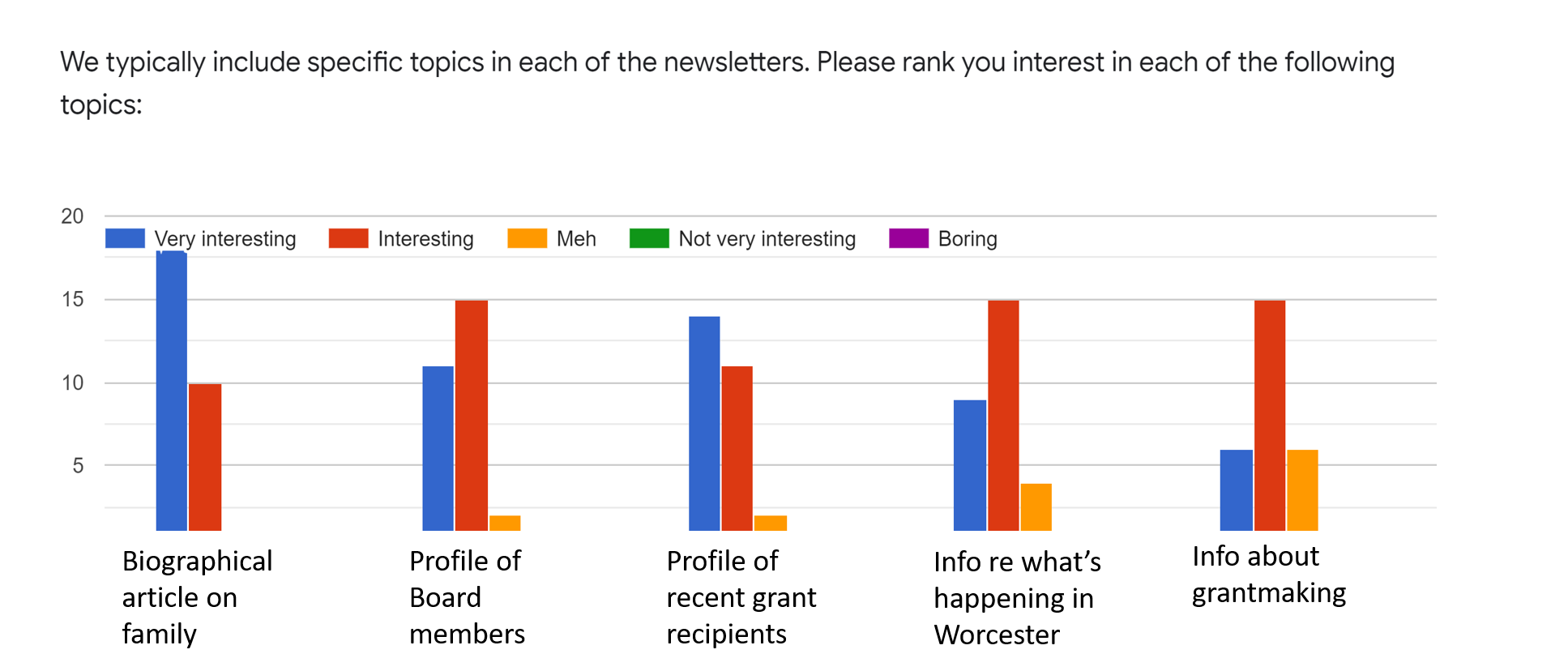
We asked what areas of philanthropy interested you the most, as evidenced perhaps by your personal philanthropic interest in your home community. The strongest category was basic needs (food and shelter), followed closely by education and physical/mental health.
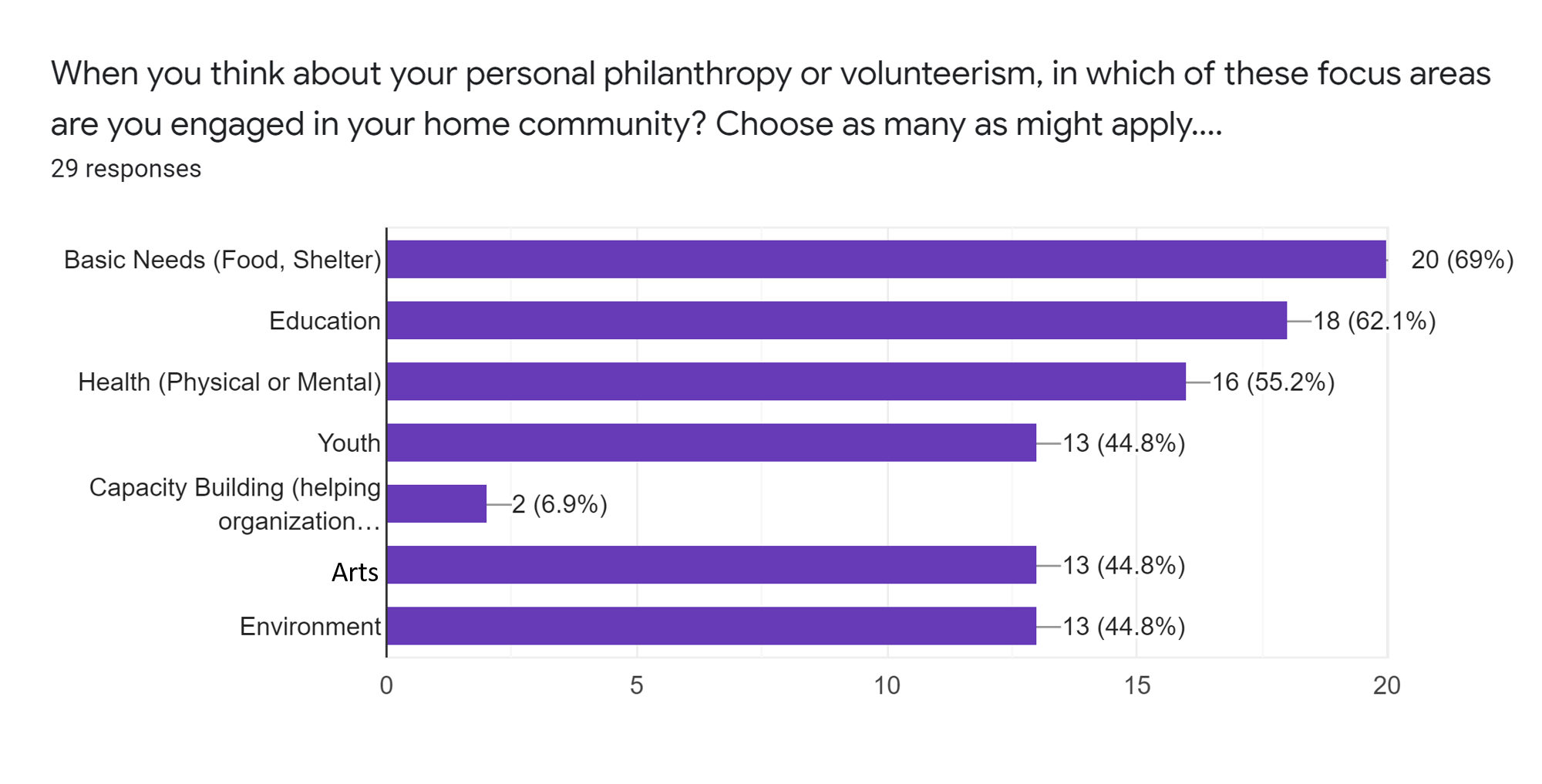
We also asked if any of you might be willing to submit articles for the newsletter, and almost 52% said yes. We will be following up on this as we move forward, perhaps soliciting full articles or shorter “snippets”. We also think there might be some very interesting photos out there, which would need to include a bit of written context to make sense. So, start digging into those dusty old family files!
And, last but not least, we asked folks to complete the following sentence: “You know you’re a Daniels when…” We received many references to hair, as in the lack thereof, as well as lumpy uncomfortable mattresses, consumption of adult beverages, and tendencies towards tight money management. See the following article for additional details!
You can view all the survey results by clicking on this link. Thanks, family!!
You Know You’re a Daniels If…
As part of the recent survey, we asked respondents to complete this sentence, and most folks obliged us. What fun to see what people had to say!!
The most popular response had to do with it being 5:00 somewhere, (cheers!), or not being able to stay away from our close relative JACK. There were also references to the call at 5:30 being for cocktails, not dinner, and getting around the croquet course in two turns with two beers.
Another common response had to do with the infamous Daniels hair. Many acknowledged the tendency to either thin or fall out, and to turn salt and pepper regardless of its youthful color. It was also noted that our family enjoys and don’t care if they have “salt-air hair.”
Also frequently noted were references to “Old Rusty Wallet” behavior, helping to write the “Tightwad Gazette,” and taking delight in outwitting Uncle Sam!
And, last but not least, there were references to seeing “that Daniels nose” in the mirror, sleeping on horsehair mattresses left over from the three brother’s era, and excelling at “passive aggressive behavior.”
And on a positive note, someone commented that seeing the amazing opportunities available in Worcester reaffirmed them being a Member of the Daniels family.
Esther Martin Daniels
By Bill Pettit
This is the final installment of the series of biographies of the wives of the G1 brothers. Esther Daniels was the wife of the youngest founding brother, Dwight, and coincidentally my grandmother.
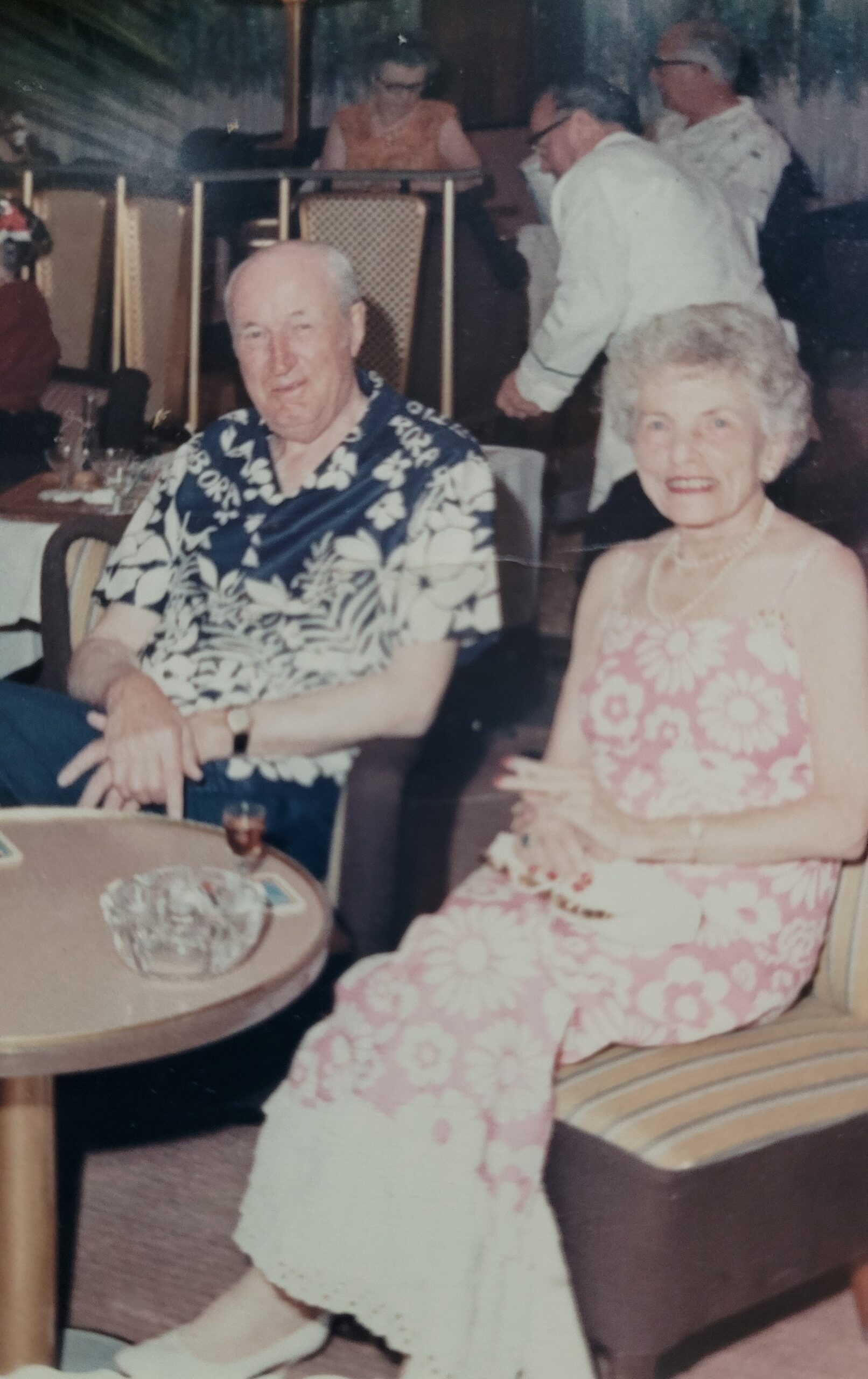
Esther was born in 1895 in Gloversville New York. Esther’s father owned a glove business for many years. She went off to Smith College, where, as previously mentioned, she met Eleanor Goddard. Esther met Dwight Daniels during a Smith/Yale mixer.
So, what do I remember of Nana, as we called her? Right off the bat, she never cooked a meal in her life. She smoked Benson and Hedges cigarettes and sipped cocktails, mostly Canadian Club. She was always immaculately dressed, bedecked in jewels, with a hint of perfume, and had a slow deliberate pace at whatever she was doing (which was mostly sitting in a large wingback chair that today graces my living room).
Once a week she would be driven to the hair salon and have her hair done. On the special days, Christmas, Easter, and Thanksgiving we would meet the two of them at either the Worcester Club or at their apartment for “dinner” which was always at noon after a cocktail.
In my early years we would join them at their Cape house in West Harwich for a month of idle summer days on the beach. They also would spend a week in Florida and go to Eaton’s Ranch for riding.
As I grew into adulthood, how I perceived her changed as I became more aware. She had a series of small “heart attacks”. I noticed that they never ever had come to our house for a meal or a visit. They stopped most of their travel.
Perhaps those changes were crushing river of time taking its toll, and in 1985 she passed away at the age of 90.
One can mourn the loss of family member in a long slow way. I wanted to make sense of her. I super liked her: she was friendly and always slipped me ten bucks. Even when she was in the nursing home, she sat in that wingback chair and I held her hand. But she was an enigma.
Things my mother said to me about her mother, my grandmother, seemed to categorize her as an agoraphobic. She never left that apartment. Dwight would daily walk to the Worcester Club for lunch, but she stayed home.
However, while they went to the Cape, Florida, and cruises on cruise ships, she never left that apartment except to get her hair done. We accepted things the way they were, but I was puzzled.
After her friend and neighbor Mrs. Ashey died, she told my sister that Mrs. Ashey would not have died if she hadn’t gone out so much. That was a data point I heard years after she died and thus, I decided she was truly agoraphobic.
And for the next 30 years that’s the way I left Nana in my head: beautiful, aristocratic, opinionated, and agoraphobic. End of story.
2020 has come around and now, a year later, we are hopefully in the tail end of a global pandemic. We all have been living in one form of fear or another for 12 months. The Spanish flu of 1918 came to mind so last fall I read up on that in the hopes of lessening the mystery of what pandemics are and more importantly lessening my own fear.
That was fascinating reading, and I had no idea that the first foothold the Spanish flu got in the United states was outside of Boston at Fort Devens Army Base brought there by the troops from France. From there the Spanish flu ravaged across the county and killed a total of 50 million people worldwide until it finally petered out a year later. That is compared to 2.7 million worldwide deaths due to Covid as of today. It was brutally deadly.
That is when I began to put together an alternate theory about Nana. In 1916 right after her college graduation she married and left Gloversville moving to Worcester to begin her adult life, presumably with hope and joy. She, a little wisp of a 21-year-old, marries a dashing fun-loving rich Yale man from a powerful family. A mere two years into this life, in 1918, the country enters World War I and Dwight joins the Army as an officer. I don’t know much about what he did, but it involved ordnance, and he stayed local, perhaps stationed at Fort Devens.
In 1918 Dwight contracted the Spanish flu, was ill and thankfully survived.
I consulted with a professional and described my grandmother and her life. He said she wasn’t acrophobic. An agoraphobic would not have been able to leave the house even to get her hair done much less go to the Cape and go on cruises. He postulated that she may have had a deep seeded lifelong anxiety, and we suspect it formed when as a newlywed, in a new life, away from her family, as a 23-year-old, probably alone while Dwight was away, she faced the real expectation, every day for at least a year that the pandemic was going to kill her husband and maybe her as well, especially if she went outside, like Mrs. Ashey did.
From 1918 until 1985 the Spanish Flu perhaps held a bit of my Nana’s core being hostage. And thanks to the last year I could relate to what she must have felt 103 years ago. I know from now on I’m going to wear a mask on the subway when visiting my son and his family in New York. Our world has changed.
I will circle back and say I loved that woman who never cooked a meal in her life and cherish my 1980 memory of holding her hand for a half hour in her nursing home room even if she didn’t really know who I was. I still remember my smile because I was quite sure in that moment, austere Nana did not hold people’s hands. It was just the way she was.
Smaller Grants
While our e-newsletter has typically highlighted grant recipients being awarded $25,000 or more, the Daniels Foundation also awards smaller grants on a regular basis. As a board, we have debated this issue—should we award fewer larger grants or continue to support organizations at the $3,000-5,000 level. Our decision has been to continue with these smaller grants, where we believe that the amount may be small, but the benefit to the organization could be major. The following articles on two music organizations in Worcester demonstrate this principal with examples of individuals who have benefited from the monies received.
Pakachoag Music School
Since 2011, the Daniels Foundation has approved the grant request in the range of $3,000 annually for the Pakachoag Music School. Though it is a smaller request amount, the impact of our funding has helped expand and develop this school through the years. As the Board has consistently looked to fund programs where our dollars can have the greatest impact, we want to spotlight one such group. In this article you will learn more about the Pakachoag Music School’s programs and the students in attendance.
The Music School has a positive comprehensive impact working with students from kindergarten to well past retirement age. They have been nimble in responding to the pandemic. In Summer 2020, they launched the new Pakachoag Connect: Online Learning Options program and are just now starting to offer a small number of in-person lessons again. They work in partnership with 2 other organizations the Daniels Foundation has historically funded: the African Community Education program and the Boys & Girls Club of Worcester.
The school features different students periodically on their website and those individuals showcase the diverse variety of their students. Recently featured students included an adult piano student Neel Smith who could not imagine going through the current pandemic without music. He feels “a lot of us have been shut off from so many experiences with no concerts at Mechanics Hall, no recitals at Pakachoag Music School, and no choral groups to sing with.” Making some kind of music at home has been more important than ever for Neel.
The music is so important to his wellbeing, that he (like all of us) had to work his way through new technology platforms to do what he loves. With the challenges of using technology for lessons, Neel and his teacher, Janeen Baker, were able to figure it out together. For instance, if his Wi-Fi dropped out, and they had to continue with a shaky phone connection, they persevered and worked it out.
Another student is Varsha Swaminathan, now an 8th grader, who has been part of New England Conservatory’s pre-college orchestra for three years. She was accepted by audition last year into the Junior Central District Orchestra. She has been inspired by the young world-renowned violin musician, Chloe Chua, age 11 from Singapore. The school has offered Varsha a chance to practice the violin herself but also learn about others around the world who have the same passion. The school responded saying “at Pakachoag, we are happy to support Varsha’s dreams. Setting goals and working hard is the way to do it, one step at a time.”
Maya is 9 years old and another student. She first came to Pakachoag in 2012 as a summer early childhood / music and movement student. In 2014, Maya began violin lessons with Dr. Leah Zelnick. When Maya was asked about her music, she said: “I like playing the violin because some of my family members play the violin and I really admire their talent. My parents suggested to try it myself and play with them someday. I said yes. I tried it out and I loved it! The number one reason I love playing the violin is because it is so much fun and the songs always get stuck in my head!”
The Daniels Foundation is so pleased to be a supporting force for places that brighten the human soul. Joy is such a precious feeling and Pakachoag Music School is a cultivator of pleasure, accomplishment, and joy.
Salisbury Singers
Like the Pakachoag Music Group, which is mentioned in this e-newsletter, the Daniels Foundation has funded the Salisbury Singers for many years. They have been in existence for 47 years, and before COVID, the 55 members of the group meet weekly to rehearse for 1 ½ hours each week September thru June. This dedicated group of volunteers loves to sing and is passionate about enhancing the cultural life in the Worcester area. They are a member of the Worcester Cultural Coalition and have sung a variety of music, including Handel, Mozart, Brahms, and blue grass in a number of different venues.
To illustrate the power of the group, Will Goliger, as a freshman at Assumption, joined the group. Now several years later, he is still with the group serving as Conducting Fellow earning credit for his graduate program. He works closely with Brad Dumont, the music director of the Salisbury Singers. Will’s involvement in the group grew deep when he felt their genuine support at the tragic death of his Mom. He felt a deep embrace by the entire community.
Music, especially singing, is such a powerful tool for restoring the soul and coping with grief!
We take great pride in knowing that the Daniels Foundation has and is able to financially assist such a dedicated group that has given enhancement to the cultural life of Worcester for 47 years.



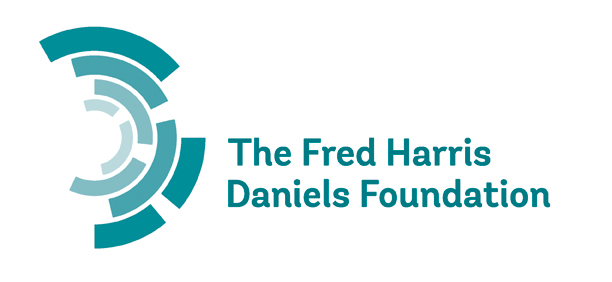

Sorry, the comment form is closed at this time.